In 1966, at a gathering of J.R.R. Tolkien fans in New York City, the poet W.H. Auden—once a student of the Professor’s at Oxford—famously stated: “Tolkien is fascinated with the whole Northern thing.” In describing Tolkien thus, Auden coined a phrase that encompassed more than mere geographical direction. It was, according to the late Steve Tompkins, himself a formidable essayist and scholar of Tolkien’s work, “the mythology, many-legended history, and darkness-defying worldview of the ancient Germanic and Norse peoples.” This dynamic was woven into the cultural DNA of the Professor’s beloved Anglo-Saxons, as well. All the peoples of the north held the same basic belief: that Fate was inexorable, that the good fight must be fought, and that victory—however glorious—was transient. In the end the monsters would win, and the long twilight of the north would give way to an eternal darkness where even the gods were doomed.
While Tolkien is arguably the most recognizable standard-bearer of “the Northern thing”, he was by no mean the first. Antiquarians and writers such as George Webbe Dasent, William Morris, H. Rider Haggard, and Arthur Gilchrist Brodeur poured forth thunderous tales of naked will and courage unfolding in the shadows of a pre-ordained ending of the world. And readers in the 19th and early 20th centuries lapped it up. Since then, whole generations of writers have turned their eyes in Auden’s so-called “sacred direction”, seeking inspiration for their own fiction in the tales and myths of pre-Christian Scandinavia. Myself included. Below, I give you five such books—not necessarily the most popular or the best-of-the-best, but five books which nonetheless embody the whole Northern thing, with its clash of iron and its grim determination that while an enemy might ultimately win the day, he won’t win this day.
Hrolf Kraki’s Saga by Poul Anderson
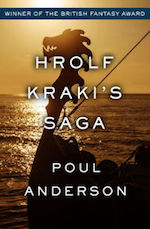 In the great tapestry of northern legend, the name Hrolf Kraki is woven throughout in glittering silver thread. We know of him from such diverse sources as Saxo Grammaticus’s Gesta Danorum; from the sagas of the Skjöldunga and the Ynglinga; from the Skáldskaparmál of the Norse; from the Anglo-Saxon Beowulf, and especially from the eponymous Icelandic tale, Hrólfs saga kraka. What Poul Anderson has done, though, is to take this remote figure of Arthurian proportions and render him in flesh and blood for the modern reader, giving context to the sometimes inexplicable motives and feelings of the ancient Scandinavians. Hrolf Kraki’s Saga is a grim and magnificent tale, filled with betrayal and murder, sibling rivalry and incest, and enough ax-play to sate a berserker.
In the great tapestry of northern legend, the name Hrolf Kraki is woven throughout in glittering silver thread. We know of him from such diverse sources as Saxo Grammaticus’s Gesta Danorum; from the sagas of the Skjöldunga and the Ynglinga; from the Skáldskaparmál of the Norse; from the Anglo-Saxon Beowulf, and especially from the eponymous Icelandic tale, Hrólfs saga kraka. What Poul Anderson has done, though, is to take this remote figure of Arthurian proportions and render him in flesh and blood for the modern reader, giving context to the sometimes inexplicable motives and feelings of the ancient Scandinavians. Hrolf Kraki’s Saga is a grim and magnificent tale, filled with betrayal and murder, sibling rivalry and incest, and enough ax-play to sate a berserker.
Swords of the North by Robert E. Howard (Rusty Burke, ed.)
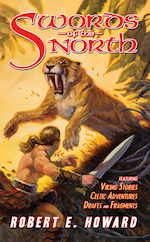 Of all the writers on this list, only Robert E. Howard had a view of the world not dissimilar from the grim ideals of the North. Indeed, it colors his work, from his first published story, “Spear and Fang” in 1924, to the last tale of that indomitable barbarian, Conan of Cimmeria, written before Howard’s death in 1936. Without exception, his characters—though lusty and larger than life—fight against “the iron collar of Fate” to make their mark upon the world before “sinking into final defeat with the froth of a curse on his lips.” This hefty 540-page volume, though rare, collects the finest examples of Howard’s prose and verse exemplifying the Northern thing. My own favorites include “The Grey God Passes,” about the Battle of Clontarf, and the brief but haunting “Delenda Est”.
Of all the writers on this list, only Robert E. Howard had a view of the world not dissimilar from the grim ideals of the North. Indeed, it colors his work, from his first published story, “Spear and Fang” in 1924, to the last tale of that indomitable barbarian, Conan of Cimmeria, written before Howard’s death in 1936. Without exception, his characters—though lusty and larger than life—fight against “the iron collar of Fate” to make their mark upon the world before “sinking into final defeat with the froth of a curse on his lips.” This hefty 540-page volume, though rare, collects the finest examples of Howard’s prose and verse exemplifying the Northern thing. My own favorites include “The Grey God Passes,” about the Battle of Clontarf, and the brief but haunting “Delenda Est”.
Eaters of the Dead by Michael Crichton
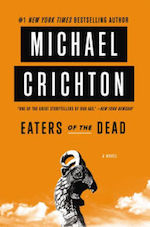 Though perhaps best known as the author of the wildly popular techno-thriller Jurassic Park, in 1976 Michael Crichton explored the Northern thing with Eaters of the Dead: The Manuscript of Ibn Fadlan Relating His Experiences with the Northmen in AD 922. Utilizing as his starting point the actual 10th-century manuscript of Ahmad Ibn Fadlan—who was an emissary from the Caliph of Baghdad to the king of the Volga Bulgars—Crichton skillfully builds a unique tale that mirrors the epic Beowulf. The tale veers from the historical when Ibn Fadlan is taken North against his will by a band of Vikings, led by the mighty Buliwyf, to combat a creeping terror that slaughters their people in the night. Along the way, the reluctant hero bears witness to the curious customs of the Northlands, from ship burials and human sacrifice to single combat and the fatalistic philosophy of the Viking.
Though perhaps best known as the author of the wildly popular techno-thriller Jurassic Park, in 1976 Michael Crichton explored the Northern thing with Eaters of the Dead: The Manuscript of Ibn Fadlan Relating His Experiences with the Northmen in AD 922. Utilizing as his starting point the actual 10th-century manuscript of Ahmad Ibn Fadlan—who was an emissary from the Caliph of Baghdad to the king of the Volga Bulgars—Crichton skillfully builds a unique tale that mirrors the epic Beowulf. The tale veers from the historical when Ibn Fadlan is taken North against his will by a band of Vikings, led by the mighty Buliwyf, to combat a creeping terror that slaughters their people in the night. Along the way, the reluctant hero bears witness to the curious customs of the Northlands, from ship burials and human sacrifice to single combat and the fatalistic philosophy of the Viking.
The Last Kingdom by Bernard Cornwell
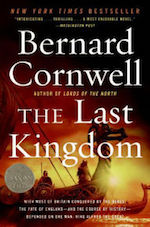 Bernard Cornwell’s is a familiar name to fans of historical fiction; he is the reigning king of the bloody and thunderous epic, with tales running the gamut—from the Stone Age through to the Napoleonic Wars. But with The Last Kingdom, set in a 9th-century England wracked by war, Cornwell really hits his stride. It is the tale of Uhtred son of Uhtred, a dispossessed earl of Northumbria, who is captured as a child and raised by pagan Danes. Uhtred is a Viking in all but blood, as swaggering and headstrong and profane as his foster-brother, Ragnar Ragnarsson—and every inch as dangerous in that crucible of slaughter, the shieldwall. Historical fiction is close cousin to fantasy, and Cornwell blurs the edges between the two by having characters who believe in the myths of the North, in the power of prophecy and magic. This clash of cultures, and of faiths, comes to a head when Uhtred is forced to choose: live as a Dane and become the enemy of God and King Alfred of Wessex, or return to the Saxon fold, pledge himself to Alfred, and perhaps win back his stolen patrimony: the Northumbrian fortress of Bebbanburg.
Bernard Cornwell’s is a familiar name to fans of historical fiction; he is the reigning king of the bloody and thunderous epic, with tales running the gamut—from the Stone Age through to the Napoleonic Wars. But with The Last Kingdom, set in a 9th-century England wracked by war, Cornwell really hits his stride. It is the tale of Uhtred son of Uhtred, a dispossessed earl of Northumbria, who is captured as a child and raised by pagan Danes. Uhtred is a Viking in all but blood, as swaggering and headstrong and profane as his foster-brother, Ragnar Ragnarsson—and every inch as dangerous in that crucible of slaughter, the shieldwall. Historical fiction is close cousin to fantasy, and Cornwell blurs the edges between the two by having characters who believe in the myths of the North, in the power of prophecy and magic. This clash of cultures, and of faiths, comes to a head when Uhtred is forced to choose: live as a Dane and become the enemy of God and King Alfred of Wessex, or return to the Saxon fold, pledge himself to Alfred, and perhaps win back his stolen patrimony: the Northumbrian fortress of Bebbanburg.
Blood Eye by Giles Kristian
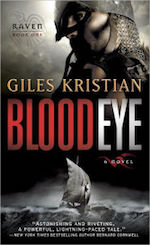 Reminiscent of Cornwell’s Uhtred, Osric—the hero of Giles Kristian’s Viking tale—is a young orphan who has no memory of his past. A deformed eye the color of blood marks him as a pariah among the villagers of Abbotsend on the coast of southern England, where he has spent his youth apprenticed to a mute carpenter. Such is the same small and lackluster life he expects to lead … until Norse raiders come to Abbotsend. Kristian’s Vikings, led by Jarl Sigurd the Lucky, are wondrous to behold: true sons of the North drawn in the vivid colors of their age; bold and fearsome and raucous men who want nothing more than wealth, wine, and women—men who seek Odin’s weather and a glorious death, sword in hand. The Norse spare Osric, who becomes one of them: a hard-as-nails reaver, a killer of men, touched by the Allfather; Sigurd names him Raven, and like a pack of wolves they fare forth in search of fortune or a storied death.
Reminiscent of Cornwell’s Uhtred, Osric—the hero of Giles Kristian’s Viking tale—is a young orphan who has no memory of his past. A deformed eye the color of blood marks him as a pariah among the villagers of Abbotsend on the coast of southern England, where he has spent his youth apprenticed to a mute carpenter. Such is the same small and lackluster life he expects to lead … until Norse raiders come to Abbotsend. Kristian’s Vikings, led by Jarl Sigurd the Lucky, are wondrous to behold: true sons of the North drawn in the vivid colors of their age; bold and fearsome and raucous men who want nothing more than wealth, wine, and women—men who seek Odin’s weather and a glorious death, sword in hand. The Norse spare Osric, who becomes one of them: a hard-as-nails reaver, a killer of men, touched by the Allfather; Sigurd names him Raven, and like a pack of wolves they fare forth in search of fortune or a storied death.
Top image from The Hobbit: The Battle of the Five Armies (2014)
 Scott Oden was born in Indiana, but has spent most of his life shuffling between his home in rural North Alabama, a Hobbit hole in Middle-earth, and some sketchy tavern in the Hyborian Age. He is an avid reader of fantasy and ancient history, a collector of swords, and a player of tabletop role-playing games. He is the author of A Gathering of Ravens, available from Thomas Dunne Books/St. Martin’s Press), a novel that pairs the “whole Northern thing” with a lifelong love of Orcs. His previous books include The Lion of Cairo, Memnon, and Men of Bronze.
Scott Oden was born in Indiana, but has spent most of his life shuffling between his home in rural North Alabama, a Hobbit hole in Middle-earth, and some sketchy tavern in the Hyborian Age. He is an avid reader of fantasy and ancient history, a collector of swords, and a player of tabletop role-playing games. He is the author of A Gathering of Ravens, available from Thomas Dunne Books/St. Martin’s Press), a novel that pairs the “whole Northern thing” with a lifelong love of Orcs. His previous books include The Lion of Cairo, Memnon, and Men of Bronze.










‘The Last Kingdom’ has been filmed and serialised on BBC.
I would like to add
‘Half a King’ [and the sequels] by Joe Abercrombie
David Drake’s Northworld trilogy is based on various Norse sagas and myths. He mixed and matched and put them in a SFnal setting with power armor and so on.
More closely related to the source material are Stephan Grundy’s Rhinegold, which is based on the Nibelungen legend, and the related book Attila’s Treasure, which brings in the legends of Theoderich the Great. Both are given a more historical setting (think the Arthur books of Jack Whyte or Mary Stewart). Grundy knows his stuff, he’s a recognized scholar of Germanic mythology.
Eaters of the Dead sure sounds a lot like the Antonio Banderas film “The 13th warrior” I assume the movie was based on the book.
Yes, 13th Warrior was based on Eaters of the Dead.
Also: E.R. Eddison’s Styrbiorn the Strong and H. Rider Haggard’s Erik Brighteyes.
And it’s a bit of a stretch, but Stephan Grundy’s Rhinegold, which is more or less a novelization of the Nibelungenlied. (EDIT: Ninja’d by DemetriosX — next time, I’ll read the other comments first.)
Oh, and my personal favorite, again a bit of a stretch, remains D’Aulaire’s Norse Gods & Giants.
William Morris translated Icelandic sagas into English, and was inspired by them to write his own fantasy novels, many of which were reprinted in the Ballantine Adult Fantasy series.
There’s the Edda of Burdens by Elizabeath Bear, starting with All the Windracked Stars.
The Irskyne books by Bear and Sarah Monette are also decidedly northern. Though there’s a decided shift in tone between the first and second two. :p
And somehow we’ve all forgotten Neil Gaiman. Not only is there his Norse Mythology, which came out recently, but also his children’s book, Odd and the Frost Giants.
@@.-@ hoopmanjh: It’s not that big a stretch, really. I mean, you’ve got Odin walking around and all. Plus the early part of the book probably has more of the Volsungasaga in it, than the Nibelungenlied. They’re essentially the same story, but the former has a bit more backstory and is the Norse version.
I haven’t actually read Rhinegold since more-or-less when it was first published; I should probably revisit it one of these days. That was my first introduction to the cheery concept of the Blood Eagle.
Also, yes, Morris, although I haven’t actually read any of his sagas — just the Ballantine Adult Fantasy titles.
The Fire Duke, first book of the Keepers of the Hidden Ways by Joel Rosenberg brings the tales of the Brisigamen into the modern age in a quite interesting fashion.
What, nobody’s mentioned the greatest Viking novel of them all?
The Long Ships by Frans G. Bengtsson first appeared in the early 50’s and seems basically unbeatable as a vivid, living depiction of a Viking life, and as an example of the Northern Thing. It’s rich with adventure, exotic locales, boon companions and violent action, all shot through with that distinctively Nordic sense of stoic humor.
If you like this kind of stuff, you can’t miss The Long Ships, but you needn’t take my word for it. Read what Michael Chabon has to say about the book…
https://www.theparisreview.org/blog/2010/06/28/the-fly-leaf-the-long-ships/
One of the best “Five Books About…” articles in a long time, if not the best. I’ve either read these or they’re on my TBR list already. I’m also taking note of many of the books in the comments.
I highly recommend what philippa has already mentioned. Joe Abercrombie’s Shattered Sea Trilogy.
BTW- I’m reading Mr. Oden’s A Gathering of Ravens now and it’s glorious.
Peter Collinson is absolutely right @10. The Long Ships is the single greatest viking novel ever. If you’ve seen the rather cheesy movie, don’t be put off. They have little in common beyond some character names.
For a real stretch and a bit of a laugh, there’s Harry Harrison’s The Technicolor Time Machine, in which a movie company goes back in time to make a movie about Thorfinn Karlsefni and the colonization of Vinland.
I tried to keep the list specific to what I’ve personally read; I have The Long Ships, but I’ve not read it, yet. I will rectify that ASAP! I’d also love to get my mitts on Robert Low’s The Whale Road.
Yes, The Long Ships is another great one — I just read it for the first time a few years ago. And I admit a certain fondness for the movie — it’s one I remember first seeing on TV when I was young, then going for years with only a vague memory, no title, not even sure that I hadn’t just hallucinated the whole thing.
Did Harold Lamb ever write any Viking stories?
Get YA Norse related story: The Troll Sea by Nancy Farmer
Rosemary Sutcliff (of Eagle of the Ninth fame) has 3 books set in Viking era Britain: Sword Song, The Shield Wall, and Blood Feud. The first two belong to a series of books where the main characters all wear a ring with a cracked dolphin insignia from Roman times to the Cromwell’s. Thus, while totally ignorant of the others, they are all linked by the ring and are possibly one long family.
Blood Feud contains a harrowing description of hauling a ship along a portage on rollers between 2 Russian rivers on the way to Constantinople.
Poul Anderson explored the Northern Thing many times. I like his 3 volumes about King Harald Hardrede, the Last Viking.
I’ve never been much into the Northern Thing, but I remember reading Day of the Giants, by Lester Del Rey, a 1959 take on Ragnarok being wrangled by Loki with some human help once Loki realized he was going to be on the gods’ side after all.
Part of Peter S. Beagle’s book The Folk of the Air uses one character’s fascination with the Northern Thing to add a bit of magic and darker emotion to the story.
And the Northern Thing elements of the Iron Druid series by Kevin Hearne include stories of Iceland told by several of the characters in the book Hammered.
That’s all I’ve got.
I am a big proponent of going back to the sources- check out the Icelandic sagas. Egil’s Saga and Grettir’s Saga are particularly good reads.
Poul Anderson’s The Broken Sword, anyone? And Parke Godwin’s Beowulf, which I thought very good. Pretty much every Conan story was the brave, heroic Northerner against corrupt, soft Southerners.
To stretch the point, but not very far, there’s E.K. Johnston’s Y.A. novel, The Story of Owen: Dragon Slayer of Trondheim. That’s Trondheim, Ontario (Canada counts as “the North,” right?). Owen Thorskard (“valiant of heart, hopeless at algebra”) is the youngest scion of a legendary family of dragon-slayers; his story is told by his fellow high-school student and “personal bard” Siobhan. Listen!
@@@@@sbursztynski The Broken Sword is a good one too. There some similarities between it and Oden’s book, A Gathering of Ravens.
@@@@@Dan- The Troll Sea has caught my eye several times. I’m kinda hesitant about YA books though.. How “YA” is it?
I will be a bit self-aggrandizing and mention my cycle of urban fantasy short stories set in Key West, Florida for which Odin, Thor, Loki, Tyr, Eitri, Brokkr, Sigyn, and Geirrod are all supporting characters at various points. Nine of the stories are collected in Ragnarok and Roll: Tales of Cassie Zukav, Weirdness Magnet. A full list of stories and anthologies/magazines they’re in are on my blog: https://decandido.wordpress.com/2017/04/25/guide-to-the-tales-of-cassie-zukav-weirdness-magnet/
—Keith R.A. DeCandido
Tom Holt not infrequently dips into Germanic/Norse myth: Expecting Someone Taller, Who’s Afraid of Beowulf, Odds and Gods, Valhalla. It wouldn’t surprise me if he went there as KJ Parker, too.
The Norse gods also make an appearance in Douglas Adams’ The Long, Dark Teatime of the Soul.
And Stephen R. Donaldson’s Gap Cycle is deliberately modeled on Wagner’s Ring cycle, which is just a version of the Nibelungenlied. (Those pesky Nibelungs get around.) It’s an extra layer of reception, but it probably counts.
@22 I think shameless self-promotion is entirely on point for a thread on Norse sagas.
Sleipnir by Linda Evans is one of my favourites, as is Norse Code by Greg van Eekhout, and Brisingamen by Diana Paxton, along with the aforementioned Rhinegold and the Keepers of the Hidden Ways trilogy.
There’s a trilogy written by Susan Krinard (Mist, Black Ice, Battlestorm).
Some interesting things here, but I’d suggest that while the Anglo-Saxons did have that Norse mythology about them, that wasn’t the only thing that molded them or the good Professor. There was also a strong strain of Celtic mythos as well that gives an undercurrent of hope. Even if the Gods fall, we can still all go into the West.
Robin Jarvis’ Wyrd Museum trilogy, A brilliant interpretation of the myths and far too dark for children imho! Nicely illustrated too.
The trilogy of Odd Tangle-Hair Saga by Bruce MacBain.
@@.-@. Hoopmanjh Don’t knock D’Aulaire’s, I had both the Norse and the Greek and loved them. And they were a great starting point, get you interested, get another book, and another, and another. I saved some childhood books that I’ve passed on to my offspring, D’Aulaire’s was in that pile
@30. Mammam — I would never knock the D’Aulaires — I read both the Greek & Norse books about a million times when I was young, and loved them unreservedly. I just reread Norse earlier this year and was pleased to find that it still held up; and I’ll be rereading Greek in the not-too-distant future.
Just remembered another good one. The King of the Wood by John Maddox Robert. It came out in the 80’s and its an alternate history about if the Norse would have started settling in North America.
OMG?!??!?! How did no one mention -to include me- The Northlanders graphic novels!!!!!
I keep trying the Northlanders… I think part of it is the tropes of graphic illustration style, but it’s sorta’ so grim I can’t stick with it!
Then there’s Cecilia Holland, whose work I adore for both style and scholarship… there is the stand-alone Two Ravens, and the “Corban Loosestrife” series (6 books, probably ended at this point) And lots of Norse-neighborly stuff in other titles, like… Great Maria is a Norman-Sicilian, Hastings and Clontarf focus around Norman and Irish battles with Norse roots; Belt of Gold is sort of Varangian, u.s.w.
And I completely agree about Bernard Cornwell’s Uhtred of Bebbanburg series, it’s got TONS of great Viking-stuff, 8-)! I chickened-out of actually watching the TV version, considering the mix-n-match-ing the great Beeb did to the Sharpe’s books!
I’m surprised that no one has mentioned Mickey Zucker Reichert and her Renshai books. Another worth mentioning is Tros of Samothrace by Talbot Mundy, a contemporary of Robert E. Howard.
@DemetriosX Interesting info on the Gap cycle. I still, after ten years, have not finished the last book.
And I almost forgot, how could I, Knight and Wizard by Gene Wolfe.
how can anyone forget Grendel by John Gardner. The monsters point of view on all the human nonsense is riveting.
@38. Thomas Youkel. Grendel!!!! I’m ashamed of myself for forgetting that book. It was probably the first book I ever read that was told from the “wrong” point of view.
So many great recs! I’d also submit Johanne Hildebrandt’s The Unbroken Line of the Moon, which is the first in a forthcoming series.
If we’re inventorying Gaiman’s takes on Norse legend, don’t forget his script for the motion-capture Beowulf (2007).
@20 – I absolutely agree about Owen Thorskard, and I don’t think it’s a stretch at all, especially not when you consider the ending of the sequel. :)
@41 — I keep kind of hoping that someday someone will take that script and refilm it with live actors so that I don’t have to stare at the soulless, dead CGI eyes for 2+ hours.
thanks for the recommendations I’m just getting more into Viking & Norse mythology now watching the Viking TV series, which is really good but I’m sick of asking what the main characters dream means. I should probably do some reading. ;)